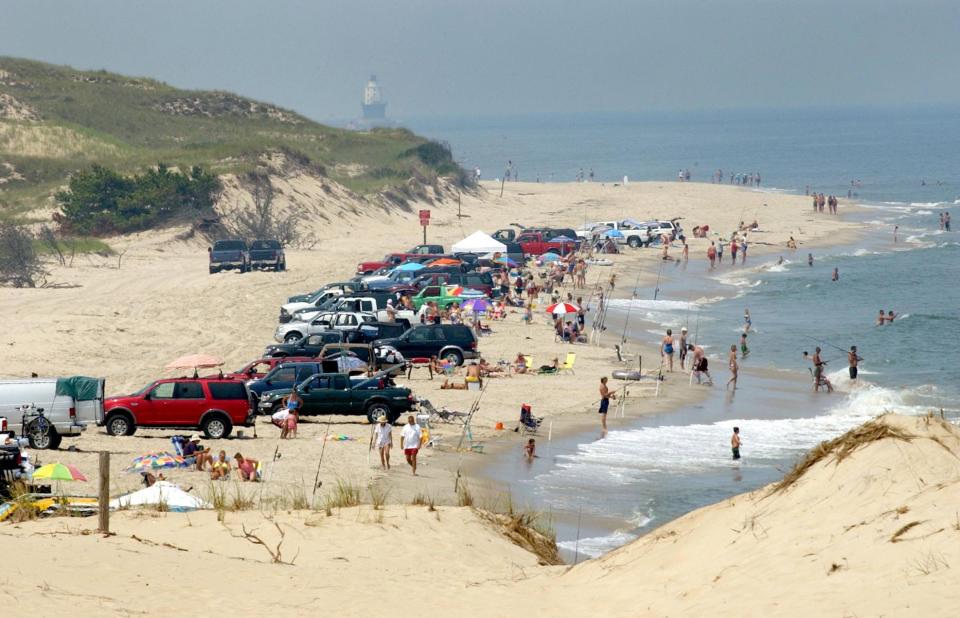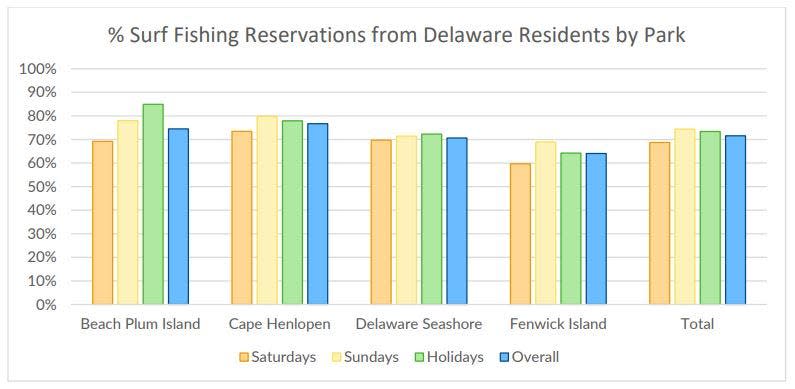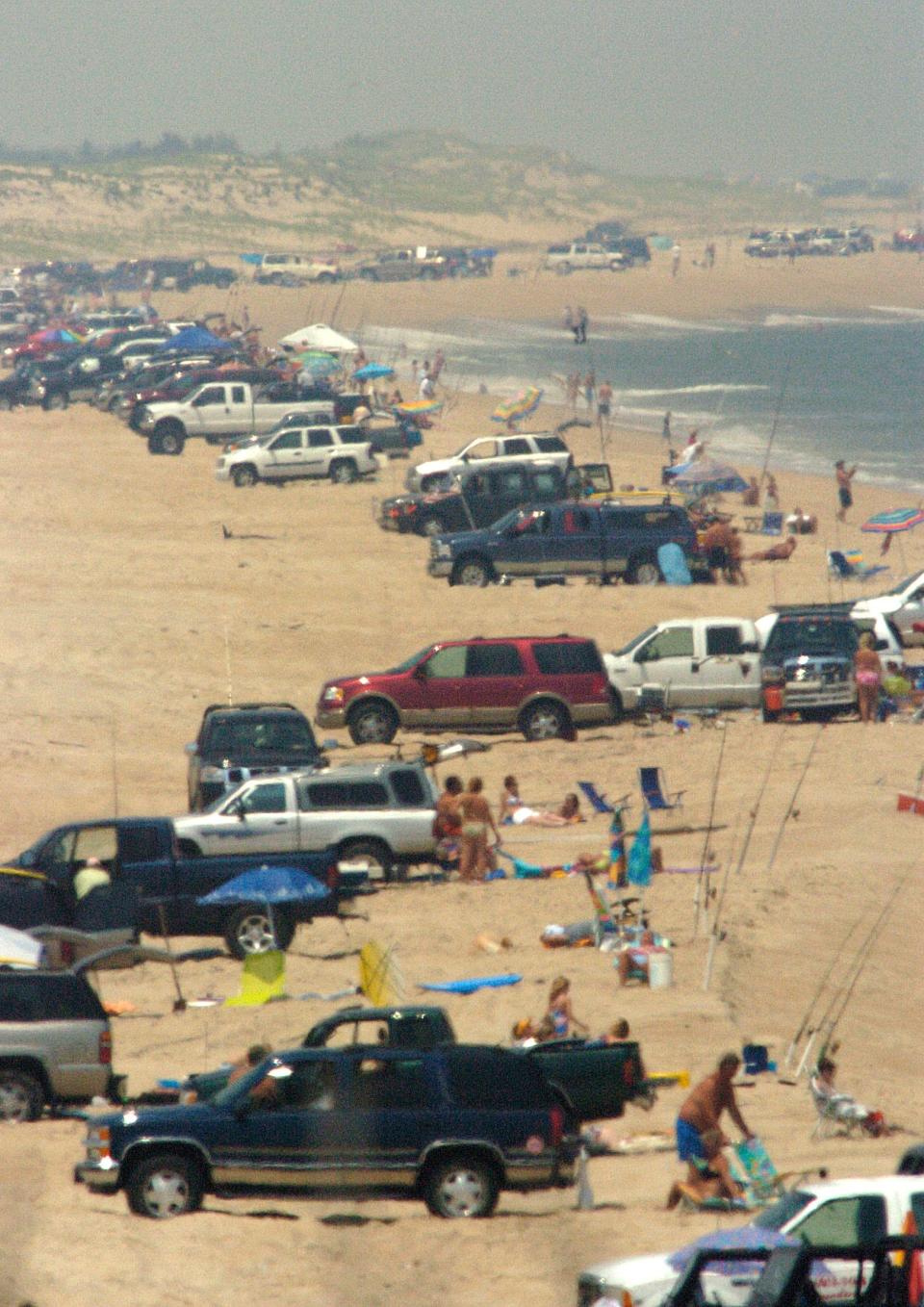Everything you need to know about surf fishing at the Delaware beaches this summer
Line in the water. Toes in the sand. Kids frolicking nearby. Beverage in hand.
As summer approaches, so does the busy season for one of the Delaware beaches' most popular activities: surf-fishing.
Once you're oceanfront on Delaware State Parks' seven miles of drive-on beaches, it's bliss, but getting there takes some work. Driving onto the beaches without getting stuck is hard enough for most people, much less navigating the somewhat complex surf-fishing permit and reservation system.
This guide to surf-fishing at the Delaware Beaches will simplify and consolidate everything you need to know. Bookmark it.

Permits and licenses
Department of Natural Resources and Environmental Control fishing licenses are required to fish Delaware waters, unless you're under 16 or over 65. They're $8.50 and can be obtained at epermitting.dnrec.delaware.gov, an authorized agent (such as Walmart or many local bait and tackle shops) or the department's Richardson and Robbins Building at 89 Kings Hwy. in Dover. Registering for a fishing license also will get you a free and required Fishing Information Network (FIN) number.
Those who choose to drive onto the Delaware beaches to surf-fish must have a surf-fishing vehicle permit, which can be obtained at destateparks.com or in any state park office. The blue and gold front-bumper plates are $90 for Delaware residents. They are assigned by vehicle and cannot be used on other vehicles. Surf-fishing permit receipts are required when on the beach, as well.
Stay for less at the beaches: Looking for hotel bargains at Delaware beaches? See where and when to stay and best rates
The surf-fishing vehicle permit acts as a fishing permit for one person. That person must still register for a FIN number. Anyone else in the vehicle that plans to fish must have their own permit and FIN number.
There is no limit on the number of surf-fishing permits the state can sell, so no need to worry about them running out.
Reservations
That's because, since 2022, the state has been using a drive-on reservation system for peak summer days.
Between Memorial Day and Labor Day 2024, a total of 33 days will require reservations (in addition to regular permits) for Delaware State Parks' seven drive-on beaches. Unlike in 2022 and 2023, this year, the weekend before Memorial Day will no longer be considered a peak weekend.
Reservations are $4 per day and can be made at delawarestateparks.com. They allow access at the chosen beach from 8 a.m. to 4 p.m. Making a reservations as soon as they become available can be important. They are first come, first serve, and some beaches will sell out. See the below graphic for reservation system windows.

If you want to avoid the peak days altogether but still want to surf-fish, you can purchase a slightly discounted off-peak surf fishing permit instead of the regular one.
There are no hard-and-fast numbers as to how many cars are allowed on a beach daily. The numbers are subject to change based on beach conditions and use, according to the Delaware State Parks website. On rainy or inclement weather days, the number of reservations is increased to accommodate no-shows, a Delaware State Parks report said.
Jurassic putt-putt: Dinosaurs are coming to Rehoboth Beach, in the form of a new mini golf course
Overall, of the 65,944 drive-on reservations available in 2023, 46,258 (70%) were sold, the report said. Cape Henlopen's drive-on beaches were the most reserved.
Last year, none of the 36 reservable days were completely sold-out, meaning there was always a surf-fishing beach within Delaware State Parks anglers could access. The most reservations total occurred on the July 4 weekend, the report said.

Rules and regulations
Delaware State Parks rangers patrol the beaches, conduct random checks and sometimes set up checkpoints. Not following these rules can result in fines, surf-fishing permit revocation or even a ban from driving on the beach.
Vehicles driving on the beach must have two axles and no more than six wheels. No motorcycles are allowed.
Only use designated crossings to enter and exit the beach. Driving on dunes is strictly prohibited.
At least one person from the vehicle must be actively engaged in surf fishing while parked. Actively engaged means the person is "taking all reasonable and necessary actions to maximize the probability of hooking and landing a fish by rod and reel attached to a bait rig or artificial lure," according to the Delaware State Parks website.
All vehicles driving on the beach must be equipped with a shovel, jack, board for the jack, tow rope, tire gauge and adequate surf-fishing equipment, such as rods, reels, baits, lures and weights. At least one person must be within 50 feet of equipment and must "tend to, cast and re-cast your line as necessary," the Delaware State Parks website says.
Only one row of vehicles is permitted between the dunes and the ocean. No double parking.
Pets are allowed on the beach but must be on a six-foot leash.
Alcohol is allowed on the beach.
Swimmers must not impede fishermen's ability to fish. Fishermen can ask swimmers to stop, move or call for a park ranger.
Visitors must remove their own trash. There are no trash cans on the beach.
Driving on the beach
Air pressure is the most important part of driving on the beach and the No. 1 reason vehicles get stuck, Delaware State Parks officials say.
Pressure must be reduced before driving on sand so the tires become wider and longer and can more easily gain traction. The Delaware State Parks website recommends a starting pressure of 20 pounds and no lower than 15 pounds.

To test for proper tire pressure, drive down the beach and then take your foot off the accelerator. Your vehicle should coast to a stop, Delaware State Parks officials say. If the vehicle stops suddenly, that means you need to let more air out.
Drive in the ruts and tracks of other vehicles, where the sand is packed and easiest to drive on. When driving up and down small hills on the beach, turn gradually. Quick turns will get your vehicle stuck.
The speed limit on Delaware State Parks beaches is 15 miles per hour. Seatbelts are mandatory and passengers are not allowed in truck beds or otherwise outside the vehicle.
If you do get stuck, use your required equipment to try and free your vehicle. You also can call a tow company. Park rangers do not assist with stuck vehicles.
Shannon Marvel McNaught reports on southern Delaware and beyond. Reach her at smcnaught@gannett.com or on Twitter @MarvelMcNaught.
This article originally appeared on Delaware News Journal: Surf fishing at the Delaware beaches 101: Everything you need to know

